The Canadians got what they wanted in 1972 with the wildly successful Summit Series, an eight game "friendly" competition between the best Canadian professionals versus the finest the Soviet Union had to offer. As the tournament progressed, the Soviets, looking like they would finish with a better record declared their intentions to claim "victory" in the series only to have the Canadians come out on top with a dramatic late goal by Paul Henderson in the final game of the series.
Thursday, September 15, 2016
1976 Team Canada Darryl Sittler Jersey
With Canada dissatisfied with the state of international hockey, owing to the controversy over the amateur status of the Soviet players, the Canadians withdrew from both the World Championships and the Olympics from 1970 to 1977.
The Canadians got what they wanted in 1972 with the wildly successful Summit Series, an eight game "friendly" competition between the best Canadian professionals versus the finest the Soviet Union had to offer. As the tournament progressed, the Soviets, looking like they would finish with a better record declared their intentions to claim "victory" in the series only to have the Canadians come out on top with a dramatic late goal by Paul Henderson in the final game of the series.
The Canadians got what they wanted in 1972 with the wildly successful Summit Series, an eight game "friendly" competition between the best Canadian professionals versus the finest the Soviet Union had to offer. As the tournament progressed, the Soviets, looking like they would finish with a better record declared their intentions to claim "victory" in the series only to have the Canadians come out on top with a dramatic late goal by Paul Henderson in the final game of the series.
Following the 1974 Summit Series, which featured a team of WHA All-Stars who were soundly defeated by the Soviets, an attempt to catch lightning in a bottle once more led to the formation of the 1976 Canada Cup tournament.
The tournament was expanded beyond the two-team competition of the Summit Series format to include not only Canada and the Soviets, but Czechoslovakia, Finland, Sweden and the United States, with each team playing the other five clubs in a round robin format with the top two then meeting in a best-of-three final.
The games were played in Ottawa, Toronto, Montreal, Winnipeg and Quebec in Canada and Philadelphia in the United States and would take place prior to the NHL season, removing any eligibility or scheduling conflicts for players, such as those faced by the Olympics and World Championships, making the all the top players worldwide available to compete.
The Canadian team was given top priority in Canada, as the political restrictions the roster faced due to the NHL/WHA rivalry that affected both the 1972 and 1974 Summit Series were also removed.
While many hoped for an anticipated a Canada vs. Soviet Union final, the Soviets did not field their best possible team, leaving several key players at home, including Boris Mikhailov, Vladimir Petrov, Alexander Yakushev and Valdimir Shadrin for reasons subject to speculation, but thought to be a combination of a power struggle between the Soviet Canada Cup coach and the Soviet Olympic Team coach, as well as a desire to downplay the importance of the new tournament, claiming their focus was on the World Championships and the Olympics, where they knew they would have the advantage of a full roster, while Canada would have the majority of it's best players occupied with the Stanley Cup playoffs during the World Championships or unavailable as professionals during the Olympics. The Soviets were also most notably without Valeri Kharlamov, who was out due to injuries suffered in an auto accident.
Canada opened with a strong statement, as they blitzed Finland 11-2. The following day. September 3rd, the Czechs beat the Soviet Union 5-3. Two days later the Soviets had to settle for a 3-3 draw with Sweden and the Czechs hammered Finland 8-0 while the Canadians got past the USA 4-2.
On September 7th, the Soviets took their turn pummeling Finland 11-3 as the USA held the Czechs to a 4-4 draw and Canada stayed undefeated with a 4-0 win over Sweden.
The Soviet Union stayed alive with a 5-0 win over the USA and the Czechs claimed the top spot in the standings with a close-fought 1-0 triumph over Canada.
On September 11th, Sweden gave the Soviets hope by narrowly edging Sweden 2-1 but they were eliminated from a berth in the finals when Canada got the satisfaction of ending their arch-rivals tournament with a 3-1 win over the Soviet Union, setting up a Canada - Czechoslovakia final.
The finals kicked off with a game in Toronto on September 13th, with Canada making it clear they were out to set the record straight as to who was the best hockey nation with a 6-0 pounding of the Czechs. Gilbert Perrault, scored just 1:05 into the game to give Canada an early lead, and their first goal against the Czechs after being shut out by them in their round robin matchup. Denis Potvin increased the lead to 2-0 at 7:56 and Bobby Orr made it 3-0 on the powerplay at 13:34. Guy Lafleur added another at 17:01 to give Canada a dominant 4-0 lead before the first period was even over.
There were no goals in the second and Canada added a pair in the third, with Orr scoring again at 11:35 and Darryl Sittler just before the final whistle at 19:56 for a final six goal margin as Rogie Vachon recorded the shutout for Canada.
The second game of the finals was held in Monteal on this date in 1976 and started out very much the same as Game 1, with Canada up by two after only three minutes, as Perreault scored early once more at 1:25, followed by Phil Esposito at 3:09.
The Czechs would respond this time though, with a goal in the second at 9:44 from Milan Novy.
The dramatic third period would see five goals, with the first coming at 2:14 as the Czechs evened the score at two when Jaroslav Pouzar scored. Bobby Clarke would give Canada the lead at 7:48, only to have Josef Augusta tie the game once more at 15:01.
The Czechs would then surprise the Canadians by taking the lead for the first time when future NHLer Marian Stastny scored less than a minute later at 16:00. Canada would force overtime when Bill Barber even the game at 4-4 with a goal at 17:48.
As the game moved into overtime Canada put two pucks into the Czech net, only to have them both disallowed. The first was on a shot by Lafleur, which got by the Czech netminder Vladimir Dzurilla, only to have Ivan Hlinka knock the net off its pegs before the puck could cross the line, earning a penalty, but no goal.
Guy Lapointe then scored at the ten minute mark, but the rules stated that the teams had to change ends halfway through the period, so the horn sounded, negating Lapointe's goal, much to the dismay of the Canadians and their fans.
Finally at 11:33 of the overtime, the clock struck midnight for the Czechs, as Sittler deked Druzilla, who had a habit of some very unorthodox play (no doubt influencing a young Dominik Hasek) and had come way out of his net, allowing Sittler to score the game winner, (finally) giving the Canadians the championship in front of the home fans in what was the most watched program in Canadian TV history at the time.
"This has got to be the biggest thrill of my life," Sittler said. "I'm not cut out to be a hero; if I was going to do it, I was going to do it. But playing with these guys on the greatest team for the greatest country is something that will remain with me forever."
Orr, who missed the 1972 Summit Series due to one of his many knee surgeries, was able to play in 1976 following his fifth knee operation. "It was Bobby's last hurrah," said Esposito. "Orr didn't show up the first week of training camp because of his knee problems, and we had some pretty imposing defensemen there. But when he arrived it was the man with the boys. He was just head and shoulders above the rest of us," said Bobby Hull.
Clarke said "I used to watch him. After the games he could hardly walk, and then he'd go out there again and play like hell. I think he played on straight determination. It's amazing what he did."
Orr finished the tournament with 2 goals and 7 assists for 9 points, tied for most in the tournament with fellow Canadian Potvin and Soviet Viktor Zhulktov, and was named Tournament MVP. Orr's performance in the 1976 Canada Cup would be ranked as #56 in the IIHF Top 100 Stories of the Century.
Of note, 16 of the 21 Canadian players would eventually be inducted into the Hockey Hall of Fame.
Today's featured jersey is a 1976 Canada Cup Darryl Sittler jersey. This unique jersey would make it's debut at the 1976 Canada Cup, with it's main design patterned after the Canada Cup trophy. This style would become an icon for Canadian hockey, as it was also used in the four subsequent Canada Cups in 1981, 1984, 1987 and 1991, something the marketing people would never allow to happen these days.
This style was revived once more, as it was the choice for the Canadian team in the 2005 World Championships when each country chose a throwback jersey from it's past.
The Canadian players participated in the ritual of exchanging jerseys after the game, a practice more commonly associated with European soccer, no doubt creating quite a challenge for collectors of game worn jerseys to locate and authenticate the set of jerseys worn in the final game after their departure for behind the Iron Curtain.
Today's video section features Sittler's cup winning goal in overtime of Game 2 of the finals.
Here is a tribute video to Team Canada with action highlights from throughout the tournament, with perhaps the cheesiest song ever written.
Enjoy these exciting highlights of the Canada vs. Soviet Union game from the round robin stage of the tournament with Tretiak in goal for the Soviets.
Labels:
1976 Canada Cup,
Canada,
Sittler Darryl
Subscribe to:
Post Comments (Atom)

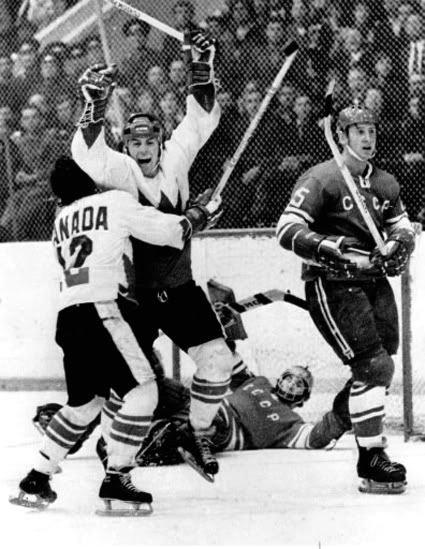
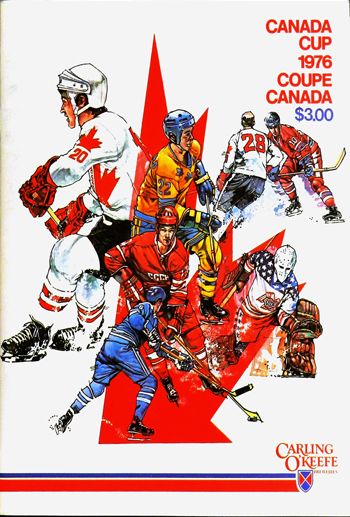
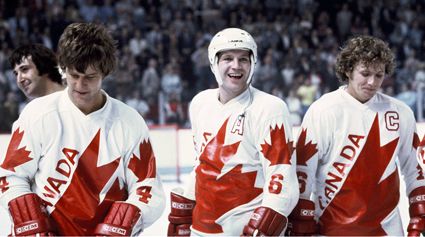
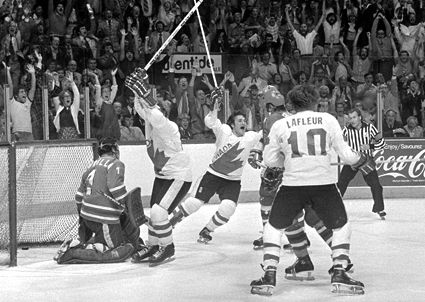
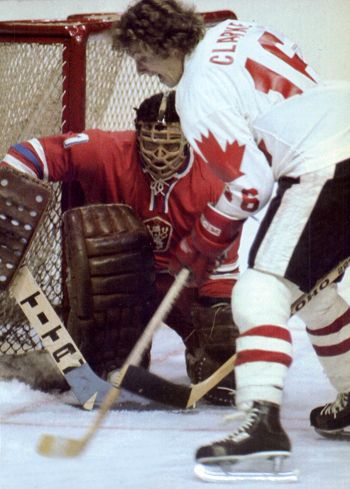
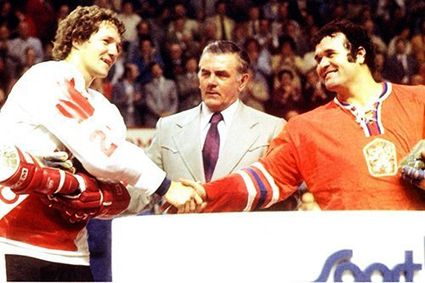
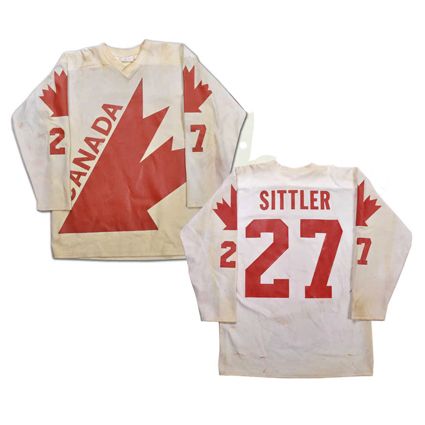










No comments:
Post a Comment
We welcome and encourage genuine comments and corrections from our readers. Please no spam. It will not be approved and never seen.